- Home
- Pauline Fisk
Sabrina Fludde Page 8
Sabrina Fludde Read online
Page 8
They both were. One look at Abren too, and Pen took them upstairs to their beds. Abren’s was a single room with a big, squashy bed and not much space for anything else. A sliding glass door opened out on a balcony. A paper lantern hung from the ceiling and long strips of red paper dangled over the bed. These were decorated with painted beads and feathers, and golden lettering which – according to Pen – wished all who slept beneath them sweet dreams.
Phaze II’s room was bigger and contained sweet-dream banners too. It also contained bunk beds, an enormous hammock strung between beams, a model of one of Sir Henry Morgan’s many warships and a glass case full of books. The floor was made of golden boards which gave off a lovely, woody, polished smell. And behind another sliding door stood a second balcony.
‘I hope you like it,’ Pen said.
Phaze II stared in silence. Abren could see that Pen was proud of the room. But as far as he was concerned, it was just a stupid scud’s room. Nothing special.
‘I’ll leave you to get settled in,’ Pen said. ‘The bathroom’s next door. There are towels on the bath, and pyjamas warming in the airing cupboard if you want them. Oh, and there’s ointment in the medicine cabinet if you need it for that face of yours.’
She slipped away, no questions asked about how Phaze II had got that face of his with its big, ripe bruises. He pulled down all the sweet-dream banners, and Abren went to investigate the bathroom. She found it a blue-tiled dream of thick pile carpets, snowy enamel basins and shining chrome taps. Phaze II came in after her, still not a word said between them. He sat on the toilet with the lid down while Abren found the ointment, tilted him into the light and attended to his face. She started with his nose, applying the ointment generously, and finishing up covering most of his skin.
‘I’m sorry,’ she whispered every time that Phaze II winced.
Phaze II didn’t answer, and Abren felt to blame for everything. Not just the bruises and all that trouble with the BC boys. But that stupid postcard, too, announcing to the world where she was hiding. And Mena’s hurt feelings. And Fee’s face when he’d told her that she couldn’t go back home with him. And Old Sabrina’s disappearance.
Everything was Abren’s fault.
You’d think that I was cursed. Everything I touch turns sour, Abren thought. Everyone I come across ends up being hurt. And now it’ll happen to these people too – Pen and Sir Henry. I’ve entered their lives and they’ll wish I hadn’t! Something terrible will happen to them, and it will all be my fault.
Phaze II got up, still without a word, and went to bed. Abren took a bath, marvelling at the filthy state of the water when she got out. Then she went to bed as well, thinking that sleep would come easily. But it turned out to be impossible, for all Pen’s banners wishing sweet dreams. Maybe it was the bed, its mattress as soft as marshmallow after nights spent sleeping on a camp bed. Or maybe it was a sense of foreboding about what tomorrow might bring.
Abren lay rigid in the bed. Down the landing she could hear Pen and Sir Henry laughing and talking to each other until long after their bedroom light had gone out. Their voices made Abren feel lonely. She missed Phaze II. Not just talking to him in the darkness, but the sound of his breathing as well, and that hacking cough of his and the way he sometimes shouted in his sleep.
In the end she got up and went to his door. She half expected to find that he had run away, but he lay stretched out on the bottom bunk, with not a muscle moving. Abren thought of waking him, but she didn’t dare. Phaze II was a mystery. Even after all this time she still never knew how he would react to things.
So she went back to her room instead, and stood out on the balcony. The night was clear and mild, stars in the sky but the moon nowhere to be seen. House lights were out all over town and everything was quiet. Abren leant against the railing, looking down a steeply terraced garden. At the bottom she could see something dark moving away between the trees. It was the river, of course. Always the river in this town – there was no getting away from it.
Abren watched it flowing past a long jetty with a boat shed built behind it, half screened by trees. Someone had left a light on inside the shed and she could see a pile of wooden planks stacked on shelves. See another basket, too, like the willow one hanging in the hall, and a row of paint tins.
Suddenly, Abren felt as if she could sleep at last. She didn’t care that she and Phaze II hadn’t made up. Didn’t care what had happened to Old Sabrina. Didn’t care that she’d spent half the day running round the town in a state of terror, chased by nothing more substantial than a half-memory. She didn’t even care what tomorrow would bring.
She went to bed, leaving the sliding window open so that she could see the river flowing past. It made her feel safe, but she couldn’t have said why.
Guinness Railwaybridge
Abren awoke in the morning to a high, tight whine which she’d never heard before. She leapt out of bed and followed it to Phaze II’s room. Here she found him nursing his ear against the pillow, crying to himself through clenched fists. She went off for the Morgans, and found them in the kitchen bustling between the toaster and the frying pan. She told them about Phaze II and explained about the stampede at the football pitch. Sir Henry spat with disgust at the mention of the BC boys, and Pen rushed upstairs.
She was down again five minutes later, bringing Phaze II dressed and ready to be taken to hospital. He didn’t want to go but didn’t have much choice. Bright and determined, Pen whisked him away. Abren wanted to go too, but Pen said that she should stay. She bundled Phaze II into her car and the last Abren saw of them was when it pulled out into the steep lane which ran up from the river beside their house.
‘Yet something else that’s all my fault!’ Abren said as she watched them go.
Sir Henry tried to coax her into eating some of the mountain of breakfast which was left behind. It was the last thing Abren wanted, but she gave in for a quiet life. While she ate, Sir Henry sat opposite her, drawing on a pipeful of his favourite smoke – dried coltsfoot, which he said grew down by the river.
Half hidden by its blue haze, Abren thought that he did indeed look like a bold Sir Henry Morgan, with his clay pipe, wild curly hair and dark-brown eyes. Even more so when he got up, pulled on a pair of tall leather boots and turned towards the back door, announcing that he was off to see what he’d caught in his putcheons. Did Abren want to come with him?
Abren didn’t know what putcheons were. Before she could ask, however, the door knocker thundered. Sir Henry went to answer it and a driver sat outside, blocking the road and yelling that he’d got a delivery for Mr Henry Morgan of Compass House, Town Walls.
‘We’ll have to look at the putcheons later,’ Sir Henry called, rushing through the house to let the driver in round the back, and unload the deliveries down at the boat shed.
Abren was forgotten, much to her relief. Suddenly Compass House was empty, and she liked it that way. It was good to be alone, thinking her own thoughts. She didn’t have to smile as if everything was all right. Didn’t have to eat to keep anybody happy, or say she’d slept like a log in the marshmallow bed, when she would have been more comfortable on the floor.
She walked from room to room, exploring the house, but with her mind always on the phone. What was happening at the hospital? She wished that Pen would ring and tell her. Why had Phaze II cried like that? Was he going to be all right? In the end she sat down by the phone, wishing that she’d insisted on going along with them, and refusing to move until it rang.
How long she remained like that she didn’t know. Only when the front-door knocker thundered again did she come to herself. She ran to the door, hoping it would be Phaze II, miraculously cured. But a police officer greeted her, standing on the narrow bit of pavement. She was a detective, she said, pulling out a wodge of official-looking papers, and she had some questions which she wanted to ask.
‘You’ll have been expecting me,’ she said, walking straight in. ‘You and your young friend. You’d b
etter go and tell him that I’m here.’
Abren explained about the hospital, hoping that the woman would go away and come again another day. But she had a job to do and nothing, it seemed, was going to get in her way.
‘Never mind,’ she said. ‘I can make a start with you.’
She marched into the Morgans’ front room, bringing with her a hint of stale tobacco, settled down on the sofa and spread her papers around her. Abren sat on a wooden chair, as far away as she could get. The woman’s job might be to ask questions, but Abren had spent months avoiding them, and she was determined not to change.
She wriggled on her chair, wishing herself anywhere but there. The woman stopped fiddling with her papers and briefly looked up. A pen sat poised between her brown-stained fingers. Abren looked into her cold eyes and longed for rescue.
‘Name, please,’ the woman said, bending over her papers again.
Abren refused to answer.
‘Date of birth?’
She didn’t have an answer.
‘Home address?’
What could Abren say? She blushed, but remained silent.
‘School? Brothers? Sisters? Home town …?’
Abren sighed and shook her head. The woman sighed too, looking up again and tapping her pen up and down.
‘All right, let’s start again,’ she said, her forehead wrinkling into a frown. ‘It’s important that we understand each other, you and I. You have a name. I want to know it. You have a date of birth, and a home somewhere and a family. A mum. A dad. An uncle or an aunty. A guardian maybe. Or a social worker. There must be somebody who’s missing you. Little girls don’t just appear out of thin air! So let’s start again, shall we? From the top. Tell me your name. Come on. It’s not too much to ask. Just a name for a start.’
She tried to smile – an expression worse even than her frown. Abren longed again for rescue, and suddenly Sir Henry appeared. He came through the door carrying a tray of coffee things.
‘Here we are,’ he said. ‘I hope you haven’t started without me.’
He poured the coffee, splashed a bit of rum in it for himself, and settled down between them like a referee. Abren turned towards him, her eyes pleading for help. The woman turned too, holding up her empty papers as if they spoke for themselves. There was little she could do to trace anybody’s family without information, she said. A first name wouldn’t hurt, just for a start.
Sir Henry looked at Abren. ‘Surely a first name wouldn’t be too much to ask?’
The woman’s eyes bored into Abren. Abren blanched. Panic dried out her mouth. ‘My name … I mean …’ She took a deep breath. ‘My name’s – Guinness,’ she said, grabbing the first name that came into her head.
‘Guinness,’ the woman said. Her voice was frosty. She wasn’t smiling any more. She didn’t write the name down on the form. ‘And do we have a surname, dare I ask?’
‘Er, yes – Railwaybridge,’ Abren said.
‘Guinness Railwaybridge.’ Again the woman didn’t write anything down. She plainly couldn’t see anything to laugh about – unlike Sir Henry, who had to turn away. ‘And can you tell us anything about yourself?’ she said, making an effort to keep her voice even. ‘A birthday? A holiday with your family? A favourite memory?’
Abren didn’t answer this time. She didn’t dare. The three of them sat in silence. ‘Is there anything that you’d be prepared to tell us about yourself?’ the woman said at last.
‘Can’t think of anything.’
The woman packed up all her papers. Perhaps she’d had special training to know when people were wasting her time. Or perhaps she could just tell anyway. Pausing only long enough to waft stale tobacco over Abren, she left the room saying she’d come back another time. Sir Henry saw her out. Abren listened as they stood in the hall, talking in low voices. Then the front door closed and the woman passed the window, heading along the town walls.
Sir Henry returned to clear away the coffee things, only to find Abren still sitting on the chair, staring at the empty sofa.
‘I’m sorry. I shouldn’t have upset her. Now she’s angry, and it’s all my fault,’ Abren said.
‘It’s not entirely your fault, you know,’ Sir Henry said. He looked down at Abren, and she found herself blushing. ‘Sometimes other people are to blame too, and sometimes no one is. But the thing that really matters, at least for now, is that you know you’re safe. And you are, you know. You’re safe with us.’
As if he’d said enough, he passed out of the room, carrying the tray. In a moment of gratitude Abren felt as if she would have followed him to the ends of the earth. But she followed him into the kitchen instead, and here an unexpected smell greeted her, driving everything else away. Pungent and rivery, it came from the stove.
Abren wrinkled up her nose. Sir Henry grinned.
‘Look what I found in my putcheon,’ he said, nodding at the cooking pot. ‘Tonight’s supper. You can help me bake it. It’s eel pie.’
‘It’s what?’
Sir Henry took the lid off the pot. Inside Abren caught a glimpse of something dark and shiny, poaching in cider vinegar.
‘I couldn’t possibly,’ she gasped.
‘There’s no such thing as couldn’t possibly,’ Sir Henry replied. ‘Particularly when you’re worried silly – and don’t tell me that you’re not – and need to take your mind off things!’
He took an apron and tied it round Abren’s waist, then took another for himself. As a means of taking her mind off things it was remarkably effective! It was only after the eel had been chopped and seasoned, laid out in a squidgy mess in the pie dish, covered with green herbs, rings of leek, soy sauce, little bits of ginger and Abren’s pastry, that her thoughts returned to Phaze II. She glanced at the phone. Why didn’t Pen ring? How was Phaze II? Was he all right, or was something dreadful wrong with him?
Suddenly she realised that Sir Henry was watching her.
‘What is it?’ she said, wondering if he’d heard something but was keeping it to himself. ‘Why are you staring at me like that?’
Sir Henry laughed, deep in his eyes. ‘I was just thinking that if your name’s Guinness Railwaybridge, then I’m the real Sir Henry Morgan!’ he said.
Abren laughed too, full of relief. ‘If you must know, my name’s Abren,’ she confessed.
‘Abren.’ Sir Henry looked impressed. ‘Well, well, well, so you’re a river girl!’
Abren didn’t have a clue what he meant, but before she could ask the back door swung open and Pen came in – without Phaze II. There was no cause for alarm, she said. He’d had some x-rays, and everything seemed fine inside his head. But his ear still ached, and the hospital had decided to keep him in overnight, just to be on the safe side.
Abren couldn’t make out whether that meant that he was all right or not. But no one seemed unduly worried. Sir Henry made Pen a fresh pot of coffee, then disappeared down to his boat shed. Pen sniffed the air and glanced at the oven, and Abren told her about the eel pie.
They ate it for supper, and it turned out to be surprisingly tasty, washed down with port wine and mashed potatoes. When he’d finished eating, Sir Henry went back down to his shed. Pen sent Abren after him with a thermos of coffee. ‘In case he’s planning to work into the night,’ she said.
Abren found Sir Henry crouched on the wooden-slatted jetty, painting black stuff on the upturned bottom of a little boat. He thanked Abren for the coffee, but didn’t stop to drink because he wanted to get finished. Abren found a second brush and helped him. The boat was shaped like a nutshell, made of wooden lathes with canvas stretched over them. Once everyone would have travelled about in vessels like these, Sir Henry said. The squire to visit his neighbours, the local traders to peddle their wares, the preacher to visit the chapels on his circuit and the local poacher to bring home his ill-gotten game.
Coracles, they were called.
‘They’ve been on the river since the dawn of time,’ Sir Henry said. ‘But most of them have gone now
. And not just coracles, but river punts and ferries and old upriver trows. And the men have gone too – the river men who earned their living on the waters. And now they’re lonely waters. A tame river, not a working one. And all that’s left for us to do is read about the old days and wonder what it was like.’
Sir Henry sighed. Abren remembered what he’d said about her being a river girl, and wanted to ask him what he’d meant. But he got up as if he’d had enough for one night. He hadn’t finished painting, but he’d do it in the morning, he said.
He turned to go. Abren looked at the water flowing past. It was hard to imagine a busy, working river on a night like this, with the water calm, not a hint of a breeze and nobody in sight.
‘What’s its name?’ she asked.
‘Whose name?’
‘Its name – the river’s.’
‘She’s not an “it”. She’s a “she”. And she’s called the Sabrina Fludde,’ Sir Henry said.
The comfort blanket
Abren couldn’t sleep that night. She lay on her marshmallow mattress and the river’s name rose before her eyes. The Sabrina Fludde. She thought of Old Sabrina in her room under the bridge. Was it a coincidence that she and the river shared a name, or was there a connection between them – some special reason why Phaze II had called her its queen?
Abren tossed and turned, cursing Phaze II for being in hospital instead of here to answer her questions. And what about her own name – the one Sir Henry had said meant she was a river girl? Unable to get to sleep, Abren reached for her little blanket. But she couldn’t find it in the bed, and it dawned on her that she hadn’t seen it last night either. Not here, close to hand, nor anywhere else since coming to Compass House.
‘I must have left it under the railway bridge. The only thing I really own – all I have from my old life! How could I?’
Abren lay rigid, her arms empty. Suddenly her bed felt harder and colder than the camp bed had ever done. It felt like a prison cell. She couldn’t sleep without her blanket. She had to have it. To smell its special smell and feel its feathery edge against her cheek. And she had to have it now!

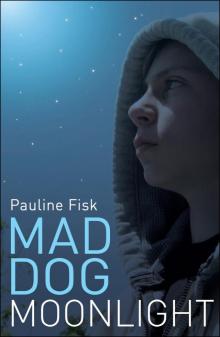 Mad Dog Moonlight
Mad Dog Moonlight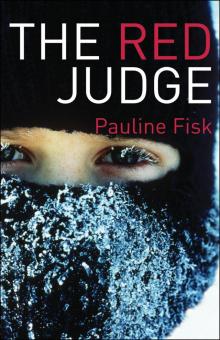 The Red Judge
The Red Judge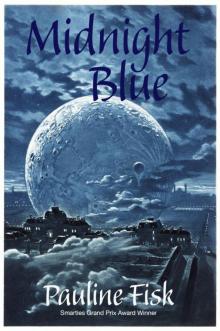 Midnight Blue
Midnight Blue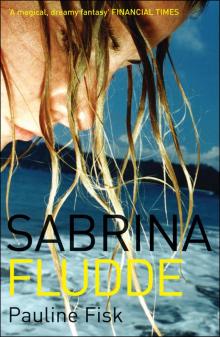 Sabrina Fludde
Sabrina Fludde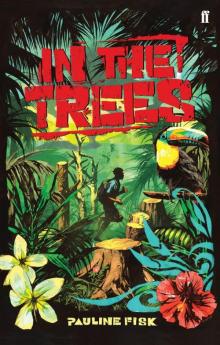 In the Trees
In the Trees